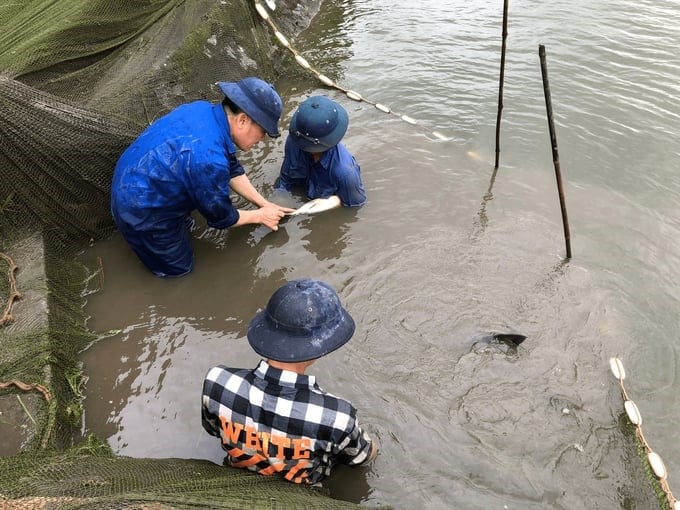May 24, 2025 | 16:24 GMT +7
May 24, 2025 | 16:24 GMT +7
Hotline: 0913.378.918
May 24, 2025 | 16:24 GMT +7
Hotline: 0913.378.918

Staff of the Farm for Experimenting, Producing, and Transferring High-Quality Agro-Forestry-Fisheries Breeds check the quality of broodstock. Photo: Dinh Muoi.
Hai Phong is a coastal city with many potentials and advantages in developing the fisheries economy in both freshwater, saltwater, and brackish water environments. Stemming from this advantage, over the years, in addition to central agencies and units located in Hai Phong paying attention to aquatic breed production such as the Research Institute for Marine Fisheries, the Northern Aquaculture Breeding Center, etc., Hai Phong's agriculture sector has also promoted the development of aquaculture and encouraged the development of farming models with high economic efficiency.
On an area of 5.78 hectares, the Farm for Experimenting, Producing, and Transferring High-Quality Agro-Forestry-Fisheries Breeds is currently being invested with 28 broodstock breeding ponds and tanks to raise freshwater broodstocks of diverse species such as grass carp, black carp, silver pomfret, striped tilapia, major cap, carp, etc. On average, each year, the unit supplies over 10 million aquatic breeds of all kinds.
Thanks to the technical process and a team of qualified staff and engineers, the aquatic breeds produced at the farm are always of good quality, meeting the farming needs of people in localities in the Hai Phong city area, thereby helping to improve farming productivity and efficiency.
Mr. Vu Van Vy, Head of the Farm for Experimenting, Producing, and Transferring High-Quality Agro-Forestry-Fisheries Breeds, said that with assigned functions and tasks, the unit is carrying out experimental research and application of technologies on aquatic breeds, such as storing genetic resources and multiplying purebred aquatic breeds to supply breed production facilities.
With a high sense of responsibility, in recent times, the unit has perfected the processes of producing, processing, and preserving breed sources and built a demonstration model of breed production technology that has been recognized by authorities and trained in the short term for breed research and production staff at home and abroad, according to each project approved by authorities.

Every year, this unit supplies the market with over 10 million aquatic breeds of all kinds. Photo: Dinh Muoi.
At the same time, the unit also developed aquatic breeds, participated in the production of key breeds for aquaculture, and played an important role and position in the development of the fisheries economy in particular and the city's agriculture sector in general.
Thereby, the quality of broodstock provided by the farm is highly appreciated by the people. The breeds are less infected with diseases and grow well. Many households raising fish from the farm’s breeds have earned a high income for their families, contributing to economic development.
"Faced with the reality of increasingly declining aquatic resources, in order to move towards sustainable development adapting to climate change, developing and building concentrated aquaculture areas to maximize exploitation of inherent advantages is the requirement set to create livelihoods for people," Mr. Vy shared.
According to the Hai Phong Agricultural Extension Center, the Farm for Experimenting, Producing, and Transferring High-Quality Agro-Forestry-Fisheries Breeds has just been reorganized and merged into the unit.
The farm has the functions of testing, experimenting, and investing in preserving genetic resources and producing high-quality seedlings of a number of fruit and forestry tree varieties. In recent years, the farm has performed its assigned tasks well and is one of four establishments recognized as qualified to produce high-quality fruit tree seeds in Hai Phong City.
In recent times, Farm for Experimenting, Producing, and Transferring High-Quality Agro-Forestry-Fisheries Breeds has had the function of participating in technical training and technology transfer on aquatic breeds, providing high-quality breeds to serve aquaculture, importing genetic resources, and collecting and storing genetic resources.
In addition, the unit also participates in maintaining the original varieties that have been invested in from the previous stage to serve the production of varieties in the following stages, as well as cross-breeding research, trial production, testing, and regionalizing new varieties and restoring varieties with good characteristics.
"In the coming time, Hai Phong Agricultural Extension Center directs this unit to continue to strengthen innovation, improve the quality of operations, and produce and develop quality aquatic breeds to supply to the market, thereby becoming a trusted address for farmers in Hai Phong city," said Mr. Nguyen Ngoc Dam, Director of Hai Phong Agricultural Extension Center.
Translated by Huyen Vu Thu

(VAN) In the tranquil wetlands of Van Long, there are quiet souls who guard the forests, nurture the waters, and oversee every bird and troop of langurs as protecting the essence of a living heritage.

(VAN) WWF, GIZ, IUCN, UNDP call for biodiversity conservation and sustainable development must be regarded as a unity in strategies for a green future.

(VAN) On celebration of International Day for Biological Diversity, Deputy Minister Nguyen Quoc Tri called for practical actions to address nature and biodiversity conservation.

(VAN) Dr. Hoang Thi Thanh Nhan – Deputy Director of the Nature and Biodiversity Conservation Agency – highlighted this on the International Day for Biological Diversity, May 22, 2025.
![Ho Chi Minh city adapts to climate change: [2] Accelerating action](https://t.ex-cdn.com/nongnghiepmoitruong.vn/608w/files/chiqk/2025/05/22/4024-4220-bien-doi-khi-hau-1-100626_766.jpg)
(VAN) Clearly recognizing the challenges posed by climate change, Ho Chi Minh city has swiftly shaped its policies and implemented practical solutions to adapt.

(VAN) Rice straw is no longer just a discarded byproduct, but it is becoming a green resource that helps farmers in the Mekong Delta reduce emissions and promote circular, sustainable agriculture.

(VAN) Other Effective Area-based Conservation Measures (OECMs) are solutions that contribute effectively to achieving the goals of the Kunming–Montreal Global Biodiversity Framework.